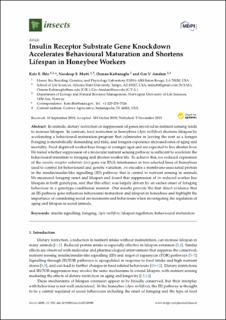Insulin Receptor Substrate Gene Knockdown Accelerates Behavioural Maturation and Shortens Lifespan in Honeybee Workers
Peer reviewed, Journal article
Published version
Permanent lenke
https://hdl.handle.net/11250/2647786Utgivelsesdato
2019Metadata
Vis full innførselSamlinger
Sammendrag
In animals, dietary restriction or suppression of genes involved in nutrient sensing tends to increase lifespan. In contrast, food restriction in honeybees (Apis mellifera) shortens lifespan by accelerating a behavioural maturation program that culminates in leaving the nest as a forager. Foraging is metabolically demanding and risky, and foragers experience increased rates of aging and mortality. Food-deprived worker bees forage at younger ages and are expected to live shorter lives. We tested whether suppression of a molecular nutrient sensing pathway is sufficient to accelerate the behavioural transition to foraging and shorten worker life. To achieve this, we reduced expression of the insulin receptor substrate (irs) gene via RNA interference in two selected lines of honeybees used to control for behavioural and genetic variation. irs encodes a membrane-associated protein in the insulin/insulin-like signalling (IIS) pathway that is central to nutrient sensing in animals. We measured foraging onset and lifespan and found that suppression of irs reduced worker bee lifespan in both genotypes, and that this effect was largely driven by an earlier onset of foraging behaviour in a genotype-conditional manner. Our results provide the first direct evidence that an IIS pathway gene influences behavioural maturation and lifespan in honeybees and highlight the importance of considering social environments and behaviours when investigating the regulation of aging and lifespan in social animals.

